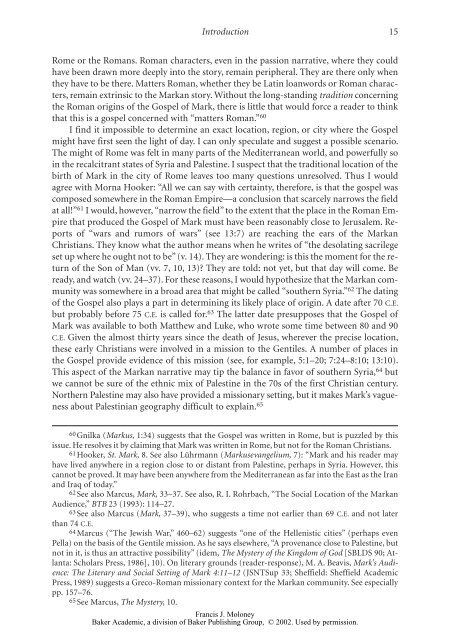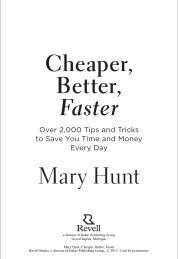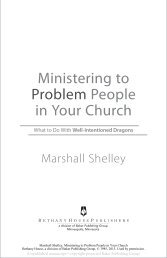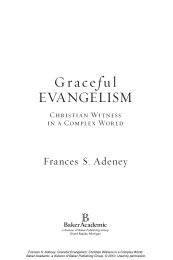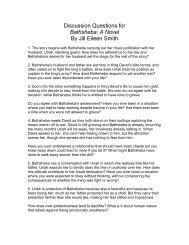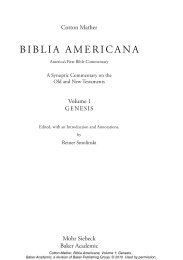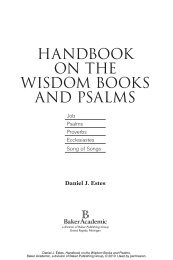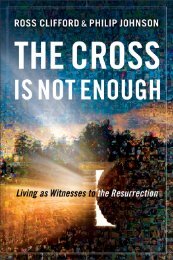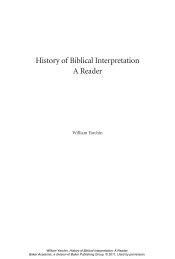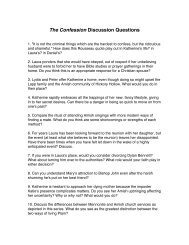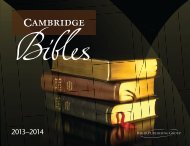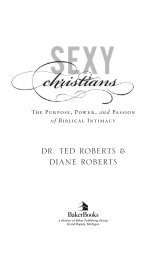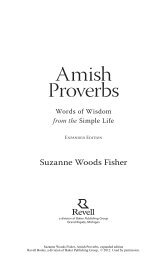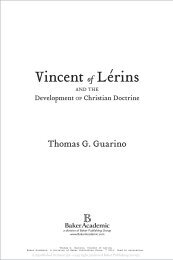the gospel of mark a commentary - Baker Publishing Group
the gospel of mark a commentary - Baker Publishing Group
the gospel of mark a commentary - Baker Publishing Group
You also want an ePaper? Increase the reach of your titles
YUMPU automatically turns print PDFs into web optimized ePapers that Google loves.
Introduction 15<br />
Rome or <strong>the</strong> Romans. Roman characters, even in <strong>the</strong> passion narrative, where <strong>the</strong>y could<br />
have been drawn more deeply into <strong>the</strong> story, remain peripheral. They are <strong>the</strong>re only when<br />
<strong>the</strong>y have to be <strong>the</strong>re. Matters Roman, whe<strong>the</strong>r <strong>the</strong>y be Latin loanwords or Roman characters,<br />
remain extrinsic to <strong>the</strong> Markan story. Without <strong>the</strong> long-standing tradition concerning<br />
<strong>the</strong> Roman origins <strong>of</strong> <strong>the</strong> Gospel <strong>of</strong> Mark, <strong>the</strong>re is little that would force a reader to think<br />
that this is a <strong>gospel</strong> concerned with “matters Roman.” 60<br />
I find it impossible to determine an exact location, region, or city where <strong>the</strong> Gospel<br />
might have first seen <strong>the</strong> light <strong>of</strong> day. I can only speculate and suggest a possible scenario.<br />
The might <strong>of</strong> Rome was felt in many parts <strong>of</strong> <strong>the</strong> Mediterranean world, and powerfully so<br />
in <strong>the</strong> recalcitrant states <strong>of</strong> Syria and Palestine. I suspect that <strong>the</strong> traditional location <strong>of</strong> <strong>the</strong><br />
birth <strong>of</strong> Mark in <strong>the</strong> city <strong>of</strong> Rome leaves too many questions unresolved. Thus I would<br />
agree with Morna Hooker: “All we can say with certainty, <strong>the</strong>refore, is that <strong>the</strong> <strong>gospel</strong> was<br />
composed somewhere in <strong>the</strong> Roman Empire—a conclusion that scarcely narrows <strong>the</strong> field<br />
at all!” 61 I would, however, “narrow <strong>the</strong> field” to <strong>the</strong> extent that <strong>the</strong> place in <strong>the</strong> Roman Empire<br />
that produced <strong>the</strong> Gospel <strong>of</strong> Mark must have been reasonably close to Jerusalem. Reports<br />
<strong>of</strong> “wars and rumors <strong>of</strong> wars” (see 13:7) are reaching <strong>the</strong> ears <strong>of</strong> <strong>the</strong> Markan<br />
Christians. They know what <strong>the</strong> author means when he writes <strong>of</strong> “<strong>the</strong> desolating sacrilege<br />
set up where he ought not to be” (v. 14). They are wondering: is this <strong>the</strong> moment for <strong>the</strong> return<br />
<strong>of</strong> <strong>the</strong> Son <strong>of</strong> Man (vv. 7, 10, 13)? They are told: not yet, but that day will come. Be<br />
ready, and watch (vv. 24–37). For <strong>the</strong>se reasons, I would hypo<strong>the</strong>size that <strong>the</strong> Markan community<br />
was somewhere in a broad area that might be called “sou<strong>the</strong>rn Syria.” 62 The dating<br />
<strong>of</strong> <strong>the</strong> Gospel also plays a part in determining its likely place <strong>of</strong> origin. A date after 70 C.E.<br />
but probably before 75 C.E. is called for. 63 The latter date presupposes that <strong>the</strong> Gospel <strong>of</strong><br />
Mark was available to both Mat<strong>the</strong>w and Luke, who wrote some time between 80 and 90<br />
C.E. Given <strong>the</strong> almost thirty years since <strong>the</strong> death <strong>of</strong> Jesus, wherever <strong>the</strong> precise location,<br />
<strong>the</strong>se early Christians were involved in a mission to <strong>the</strong> Gentiles. A number <strong>of</strong> places in<br />
<strong>the</strong> Gospel provide evidence <strong>of</strong> this mission (see, for example, 5:1–20; 7:24–8:10; 13:10).<br />
This aspect <strong>of</strong> <strong>the</strong> Markan narrative may tip <strong>the</strong> balance in favor <strong>of</strong> sou<strong>the</strong>rn Syria, 64 but<br />
we cannot be sure <strong>of</strong> <strong>the</strong> ethnic mix <strong>of</strong> Palestine in <strong>the</strong> 70s <strong>of</strong> <strong>the</strong> first Christian century.<br />
Nor<strong>the</strong>rn Palestine may also have provided a missionary setting, but it makes Mark’s vagueness<br />
about Palestinian geography difficult to explain. 65<br />
60Gnilka (Markus, 1:34) suggests that <strong>the</strong> Gospel was written in Rome, but is puzzled by this<br />
issue. He resolves it by claiming that Mark was written in Rome, but not for <strong>the</strong> Roman Christians.<br />
61Hooker, St. Mark, 8. See also Lührmann (Markusevangelium, 7): “Mark and his reader may<br />
have lived anywhere in a region close to or distant from Palestine, perhaps in Syria. However, this<br />
cannot be proved. It may have been anywhere from <strong>the</strong> Mediterranean as far into <strong>the</strong> East as <strong>the</strong> Iran<br />
and Iraq <strong>of</strong> today.”<br />
62See also Marcus, Mark, 33–37. See also, R. I. Rohrbach, “The Social Location <strong>of</strong> <strong>the</strong> Markan<br />
Audience,” BTB 23 (1993): 114–27.<br />
63See also Marcus (Mark, 37–39), who suggests a time not earlier than 69 C.E. and not later<br />
than 74 C.E.<br />
64Marcus (“The Jewish War,” 460–62) suggests “one <strong>of</strong> <strong>the</strong> Hellenistic cities” (perhaps even<br />
Pella) on <strong>the</strong> basis <strong>of</strong> <strong>the</strong> Gentile mission. As he says elsewhere, “A provenance close to Palestine, but<br />
not in it, is thus an attractive possibility” (idem, The Mystery <strong>of</strong> <strong>the</strong> Kingdom <strong>of</strong> God [SBLDS 90; Atlanta:<br />
Scholars Press, 1986], 10). On literary grounds (reader-response), M. A. Beavis, Mark’s Audience:<br />
The Literary and Social Setting <strong>of</strong> Mark 4:11–12 (JSNTSup 33; Sheffield: Sheffield Academic<br />
Press, 1989) suggests a Greco-Roman missionary context for <strong>the</strong> Markan community. See especially<br />
pp. 157–76.<br />
65See Marcus, The Mystery, 10.<br />
Francis J. Moloney<br />
<strong>Baker</strong> Academic, a division <strong>of</strong> <strong>Baker</strong> <strong>Publishing</strong> <strong>Group</strong>, © 2002. Used by permission.


